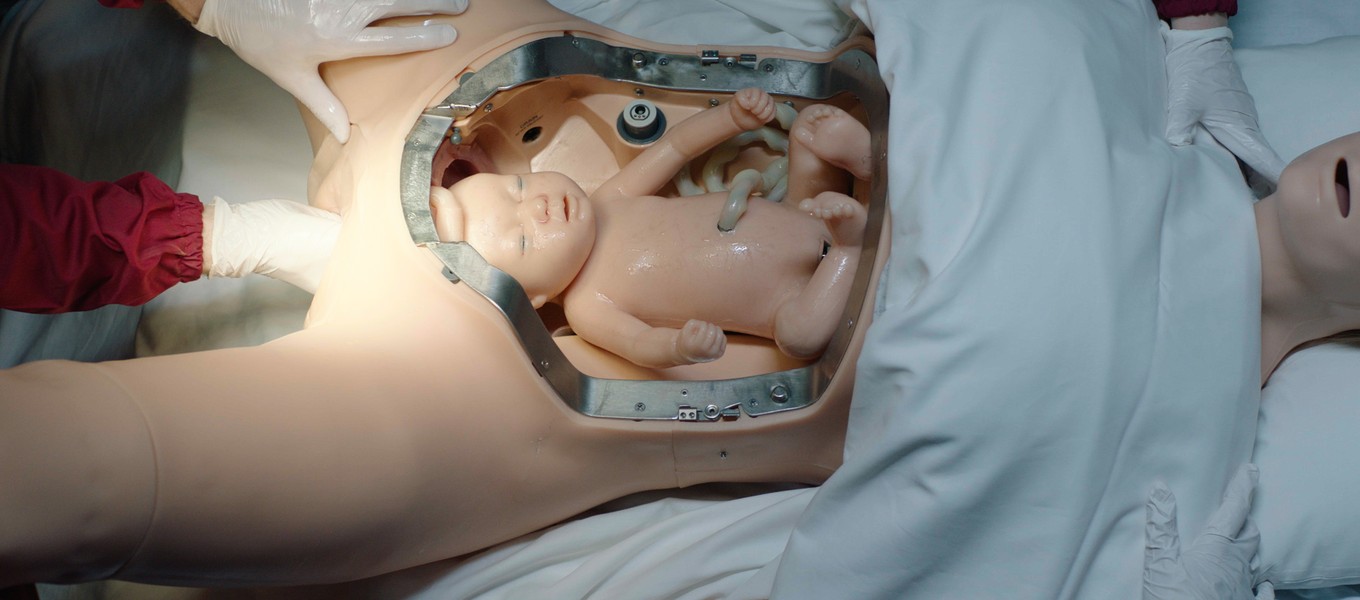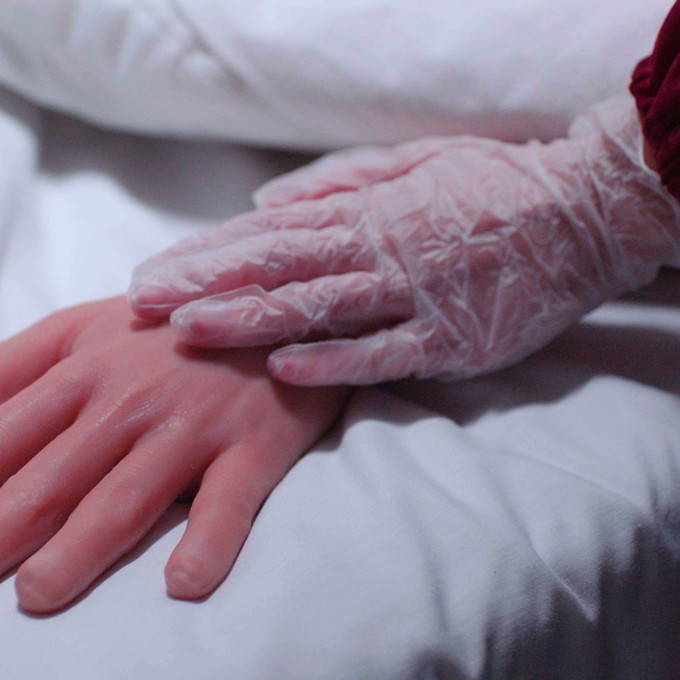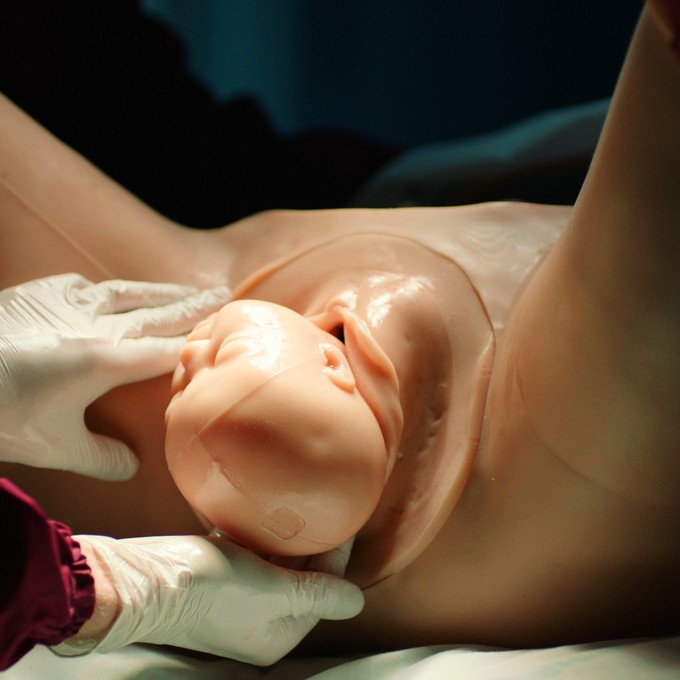Agata Wieczorek
Growing - Film - 17min - 2021
presented as part of the exhibition Panorama 23



-
Synopsis: The main character, Ewa, is a young woman at early-stage career of a medical professional. She is taking up training in a futuristic looking Simulation Center, where she practices her skills by participating in life-like simulations, impersonating medical mannequins and role-playing. At some point, she starts losing recognition between experience and simulation. Suffering from insomnia and paranoia, she faces situation where she has to find her way to differentiate reality from fiction.
-
Concept: Necro-politics (A. Mbembe) and bio-politics (M. Foucault, P. Preciado) describe systems of power where society is restrained by controlling biological aspects of individual lives. When the body becomes a political, it no longer stands for intimacy and autonomy but becomes exposed space of oppression. To reduce one to a body deprived of intimacy and ability, is an act of particular violence. Stress and paranoia the living in such realm provoke become the space for „Growing” that unfolds between the reality and its deep, subjective reception of the protagonist. Film’s action takes place in a Medical Simulation Center – one of actually existing healthcare practical education units. SIM Centres do not differ from any real hospital - the only artificial element is human body. Future caregivers train on automatized mannequins and props that replace human patients, repeatedly performing same actions: breathing, bleeding – and giving birth. In horror films, such as “Alien” (1979) and “Prometheus” (2012), both directed by Ridley Scott, pregnancy bears same traces: it is unexpected, incomprehensible and impossible to remove. As it grows inside human body, the sense of horror increases. It is disturbing how close individual's reality to the fiction can arrive taking as an example the recently forced anti-abortion law in Poland that force pregnant women deliver at any cost, regardless one’s will and abilities. Growing employs the motif of pregnancy and the film genre of body-horror. Alike Polanski’s “Repulsion”, character’s experience becomes psycho-somatic and suspended between fear, madness and the real as she loses recognition between simulation and real experience: Ewa's fear and paranoia are growing - literally - inside herself. Yet, Ewa differs to Polanski’s female protagonists. On contrary to “Rosemary's Baby” (1968), she refuses what comes out from the inseminating fear, oppressive reality – like Medea, she kills it instead. Her act does not necessarily signify positive ending. As violence is the only response film’s reality allows, imagined or real, even though seemingly freeing, Ewa's act still belongs to the violent reality that provoked it.
-
Additional text : CHAMBRE FROIDE, par : Estelle Benazet, to be published in: artist book, by The Eyes (Paris), end of 2021.
In 2020 the Polish artist Agata Wieczorek began work on a series of photographs & videos titled Growing. Currently in residence at Le Fresnoy - Studio national des arts contemporains, she is making the film part there. The producer of the project, Estelle Benazet Heugenhauser, also an artist, tells us about the film and its subject: “In a surgical space, carers are busy around a mannequin, its legs spread, resting in stirrups. The hands work together, remove the belly like the lid of a chest, and in the middle of the plastic and metal structure, a little humanoid appears, ready to be born. Other hands, down by the silicon vulva, work to extract the little body; a piston gets working and brings it into the world. [...] With hi-tech mannequins we learn by simulating care acts. Our diagnoses are becoming automated. We are becoming cyborgs, and with this cutting-edge method used by the applied sciences, the creation of knowledge occurs like any other machine operation. After the delivery of the humanoids, Ewa, the protagonist, a medical student, deals with the little one: the infant mouth moves to express something, but it is simply a pneumatic reaction from the silicon creature. [...] Ewa now gets pregnant but refuses childbearing. The doctor congratulates her and abstains from mentioning the possibility of abortion. Ewa goes home. Later, in her apartment, blood runs down her legs. Ewa gives birth alone. On the floor, where clots of flesh are spread, Ewa discovers the abject, glistening creature that she has brought into the world. She picks up a knife and hacks it up. A former student of the National Film School in Lodz, whose alumni include Polanski, (Repulsion, Rosemary’s Baby), Wieczorek is heir to a cinematic heritage of horror. [...] The brutality of the images is the only possible response to the violence suffered by all women, on whom the social and cultural mechanism imposes the destiny of motherhood. It is also a way of alerting us to the current political situation in Poland, where the right to abortion was repealed last October. We should remember that 42% of women in the world still do not have access to this human right.
Agata Wieczorek
Agata Wieczorek’s practice combines film and photography while moving between constructed documentary and documented fiction.
Human body, placed in situations that are extremely intimate and extremely political at the very same time, is a recurrent subject in her works that examines economies of gender and commodification of queer; identity politics; and how these are employed by strategies of governmental power.
She is currently artist in residence at Le Fresnoy – Studio national des arts contemporains (2020-2022). She previously graduated from the National Film School in Lodz, Poland (Direction of Photography), and from the Strzeminski Art Academy in Lodz, where she studied painting and fine art printing.
Production
Credits
› Interprétation : Agnieszka Korzeniowska, Dominika Walo, Michał Włodarczyk, Viktoria Zmysłowska
› Image : Joanna Kakitek
› Montage image : Magdalena Urbańska
› Son : Jeremy Liccardo D’Angela
› Montage son : Geoffrey Durcak, Jeremy Liccardo D’Angela
› Mixage : Benjamin Poilane, Geoffrey Durcak
› Accompagnement artistique : Athiná-Rachél Tsangári
